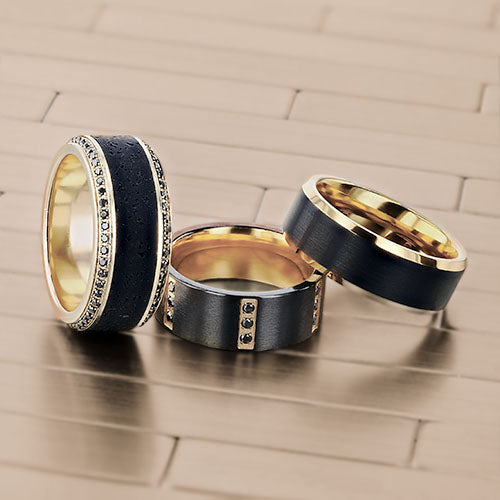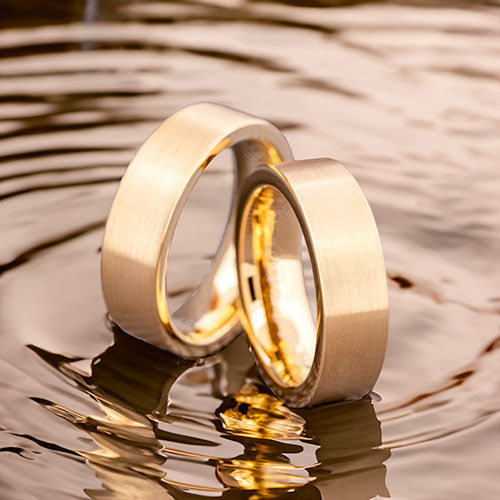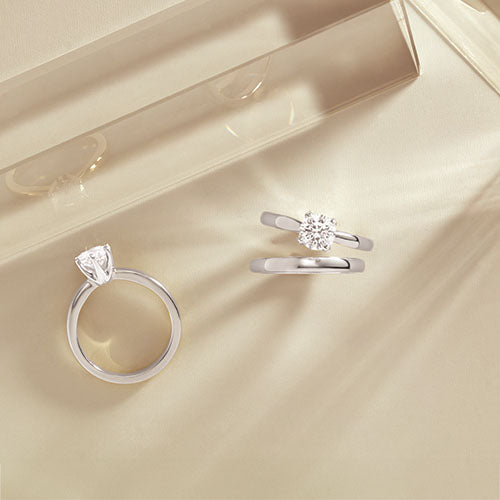Ring Care
Vansweden JewelersOur jewelry is built to last, but even the toughest jewelry isn't indestructible. Jewelry, including rings, can be damaged through physical force, scratches from harder materials, contact with water or cleaning solutions, and more.
No matter how tough your jewelry is, it will need to be taken off at least occasionally for certain activities and cleaned once in a while. Overall, a few basic precautions will keep your ring looking great for years to come.
Jewelry can be scratched, shattered, cracked, broken, or a combination of these. As a general rule, jewelry that is very difficult to scratch can be more prone to breaking if subjected to significant force or pressure. If a ring needs to be removed in an emergency, it can be cut or cracked, depending on the material.
Ring care varies based on the type of ring, the material it is made of, and whether it has an inlay, diamonds, and/or gemstones. Read below for material-specific tips for rings. Always follow the care and cleaning guidelines for the softest or most vulnerable part of the ring. This is typically the inlay or the gemstone.
Carbon Fiber
100% Carbon Fiber is lightweight and yet extremely strong. These rings will hold up well in most situations, but avoid wearing it heavy duty situations that could damage the ring. Remove it for heavy lifting, yard work, etc. No special cleaning is needed; a dab of dish soap and a microfiber cloth as needed will keep it looking new.
Ceramic
Black ceramic and white ceramic are strong materials that will not scratch easily. Ceramic rings can be broken or shattered with force or sharp impacts. Care is simple: remove and clean with a soft cloth and mild soap. A soft-bristled toothbrush works well for cleaning any grooves or textured features.
Cobalt
Clean cobalt jewelry with a soft cloth and gentle soap. Ultrasonic cleaners, jewelry cleaning solution, or soft bristle brushes can be used if needed. Cobalt is scratch-resistant but not scratch proof. It will not crack or shatter but can be cut in an emergency.
Diamonds
Take care not to snag diamonds with sharp items or with fibers from clothing, sheets, etc. Clean diamond jewelry with a jewelry cleaning solution as needed, or use a drop of dish soap and warm water. Ultrasonic jewelry cleaners are generally safe for the diamond itself, but don't use if any stones are loose or damaged. Soft brushes or microfiber cloths can help remove grime from diamond rings.
Gemstones
Avoid activities that could scratch your ring's gemstones. Some gemstones are relatively soft and need more gentle care than diamonds or other hard stones. Take care not to snag your gemstones with sharp or small items, or with fibers from clothing, bedding, towels, etc. When needed, with a gentle soap or with a jewelry cleaning solution that's labeled as safe for your specific gemstones. Don't use ultrasonic cleaners with most gemstones and semi-precious stones, including pearls, mother of pearl, shells, abalone, amber, and morganite.
Gold
Gold is a soft metal. It may scratch or dent. Clean it with a soft cloth and gentle soap. Jewelry cleaning solution, ultrasonic cleaners, and/or a soft bristle brush can be used if needed.
Inlays
All inlay rings are made from two or more materials and include some type of seam or connection between the ring and the inlay. Avoid tough activities that could separate the two materials. Further care instructions depend on the inlay material and any protective coating.
Exposed Inlays.
Some inlays are exposed and will benefit from special care. Exposed inlays may include:
- Antler
- Lava rock
- Goldstone (uncoated)
- Opal
- Lapis lazuli
- Wood (uncoated)
- Other stone inlays
For rings with exposed inlays, avoid the following:
- Water exposure (hand washing, bathing, showering, dish washing, etc.)
- Hand sanitizer
- Exposure to cleaning products
- Tough physical jobs, like yard work, lifting weights, moving boxes and furniture, etc.
- Sudden forces such as dropping or hitting the ring
- Ultrasonic jewelry cleaners
Other inlays.
Rings with inlays that are especially durable include:
- Cables and ropes
- Carbon fiber
- Gold
- Silver
- Synthetic materials
- Wood with resin coating
For these rings, avoid the following:
- Prolonged water exposure
- Exposure to harsh cleaning products
- Activities and surfaces that could scratch the inlay or coating
- Tough physical jobs, like yard work, lifting weights, moving boxes and furniture, etc.
- Sudden forces such as dropping or hitting the ring
- Ultrasonic jewelry cleaners which could loosen or damage the coating
Platinum
Platinum is a softer metal that can be scratched and dented. Remove platinum rings for heavy jobs, weightlifting, etc. Avoid harsh chemicals like bleach. Clean with a gentle jewelry cleaner, or just soap and water.
Palladium
Platinum can be scratched. Avoid harsh chemicals like bleach. Clean with a gentle jewelry cleaner made for palladium, or a drop of dish soap and soft cloth for everyday touch-ups. Ultrasonic jewelry cleaners can be used and are especially beneficial for palladium rings with grooves or textured accents that could collect grime.
Silver
Silver is less durable than some other metals, and should be removed for activities that will put physical or chemical stress on the ring. Silver typically requires more frequent care and cleaning than other metals. Avoid wearing silver when showering, using hand sanitizer, applying beauty products, cleaning, cooking, and exercising. Use a silver jewelry cleaning solution as needed. Take care when storing; you may want to consider a storage solution made for silver jewelry.
Tungsten
Tungsten is ultra-durable and practically maintenance-free. It is scratch-resistant but not scratch-proof. Tungsten can crack or shatter if it is dropped, hit, or exposed to sudden force. Clean with a soft cloth (microfiber works well) and soap. Jewelry cleaning solution and/or a soft bristle brush can be used if needed. Ultrasonic jewelry cleaners are safe for tungsten rings.
Titanium
Titanium is a hard metal that is difficult to scratch, easy to care for, and doesn't require any special maintenance. Titanium can't be cracked or shattered but it can be cut. Clean titanium rings with a soft cloth and gentle soap. Jewelry cleaning solution and/or a soft bristle brush can be used if needed, and ultrasonic cleaners can be used.
Wood
Wood that is not covered with protective jewelry resin is beautiful, unique, and vulnerable. Generally, using common sense and erring on the side of caution will keep wood jewelry in great shape. Don't submerge wood rings in water for prolonged periods. Remove for hand washing, showering and bathing. Abrasive materials will damage the wood. Do not expose wood to hand sanitizer, cleaning chemicals, swimming pool bleach, etc. Do not wear the ring for heavy lifting, lawn work, gardening, or any other activity where it will be handled roughly and exposed to force. Use care products that are specifically made for your wood jewelry; contact us for recommendations if needed.





